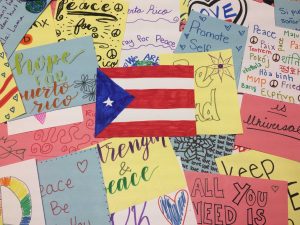
By Joergen Ostensen
A group of Fordham students started a new organization called the Humanitarian Student Union (HSU) as an effort to apply humanitarian values to issues on campus, in the local community and internationally. This organization is still awaiting approval by United Student Government (USG) and currently functions as an academic club in conjunction with the Institute of International Humanitarian Affairs (IIHA).
The original impetus for the club came from the IIHA. It wanted to have a student run organization to actively engage with humanitarian issues at both the Rose Hill and Lincoln Center campuses.
The IIHA went to students who were majoring in a part of the undergraduate classes it offers, asking them to form the Humanitarian Student Union.
“We reached out to some of the majors who were really active and asked them to take the leadership,” said Angela Wells, the communications officer for IIHA. The students wrote a club constitution and elected e-board members.
“I looked to take what’s going on in class onto campus and beyond and this club, the foundation of it, provided that opportunity,” said Neil Joyce, president of HSU.
“The primary goal of the club is to make our student body aware of the humanitarian violations and campaigns that are going on anywhere in the world,” said Joyce.
HSU tries to make issues matter to students so that they will make an effort to be involved. “We try to bridge these issues and campaigns and tie it back to who we are as students, who we are as members of a Jesuit university and who we are, frankly, as humans,” said Joyce.
The club sees humanitarian action as everyone’s responsibility. “At the end of the day our goal is to recognize our common humanity,” said Joyce.
One of HSU’s motives is to educate students on issues affecting humanity, such as the refugee crisis. The group helped put on the Refugee Simulation, which was aimed at raising awareness of the issues faced by refugees.
Joyce also said that the club hopes to directly engage with humanitarian issues.
“Overtime we hope to grow active with our New York City community as well,” said Joyce.
Wells said that having a club that engages with these issues is particularly important at this point in history.
“There are more displaced persons than at any time since World War II,” said Wells. “We’re seeing crackdowns on immigrants and refugees and asylum seekers in our own communities…conflicts are raging across the world. Climate change has caused more natural disasters, and more unexpected natural disasters than before.”
Wells said that these issues cannot be seen as irrelevant to the average person.
“There is a lot of dialogue that needs to be happening about how do we address these things in our current political moment,” said Wells.
HSU will not be a political organization, according to Wells. She said neutrality is a fundamental tenet of humanitarianism. Joyce also described HSU as “apolitical.”
However, Joyce says the club will engage in political issues, applying humanitarian values transcendent of parties.
“When we see politicians, both Democrat and Republican, attacking marginalized populations because of fear and ignorance [that is] directly to who we are as humanitarians, and…human rights issues that we are concerned about as a club.” said Joyce.
Protecting the marginalized is integral to HSU’s advocacy work. “When we see our politicians scapegoat those who are not the dominant narrative in our culture that is when we become bothered and decide to act for the sake of human beings,” said Joyce.
Wells identified what that action might mean for humanitarians in general.
“Many humanitarian organizations do advocacy work…pushing policies, pushing for particular ways that people who are affected by humanitarian crises can thrive or survive is absolutely encouraged,” said Wells.
The club is also secular in nature and encourages people of all faiths to take part.
“Our faith is a faith in humanity…it’s not about whether you believe in a higher power or not…but believing …we are all connected because we are human beings and putting faith in our common identity in hopes of achieving a better future,” said Joyce.
IIHA’s actions are based on faith in Jesuit principles. It derives its inspiration from the values of Catholic Social Teaching and social justice.
IIHA wants students to be in charge of HSU. It wants students to engage with issues that they care about and come up with their own solutions. IIHA will be involved when needed, “…if they need a connection, or if they have an idea then they can come talk to us about it” said Wells.
Other clubs on campus do humanitarian work focused on specific issues. HSU intends to go beyond what students can already get involved in.
HSU, “came up out of the grassroots,” said Eric Stolar, the group’s Vice President. It is trying to give students an opportunity for humanitarian involvement that is not currently available.
USG needs to be sure that HSU is unique from other clubs in order to give it club status. Joyce expects the club to be approved by USG before next spring and receive funding. HSU currently is funded by IIHA.
HSU encourages all Fordham students to get involved. It values a diverse body of students because that translates into “a more robust and fruitful conversation,” said Joyce.
Students interested in getting involved can email the HSU Secretary, Ryan Connor: [email protected].






































































































































































































